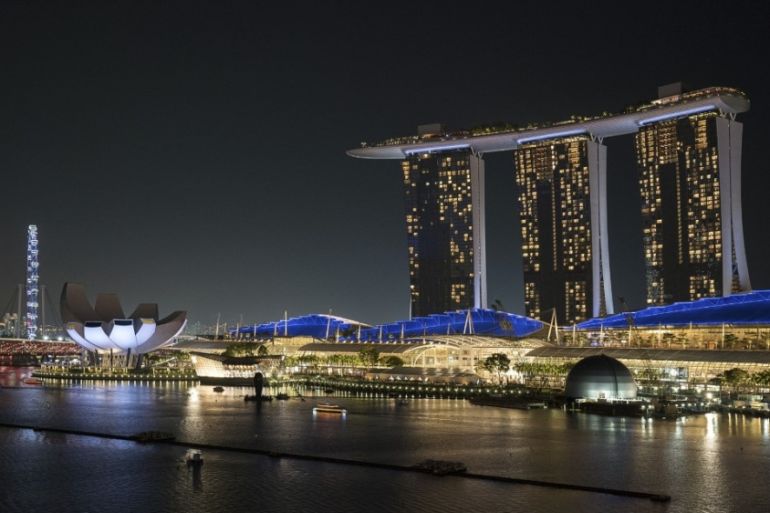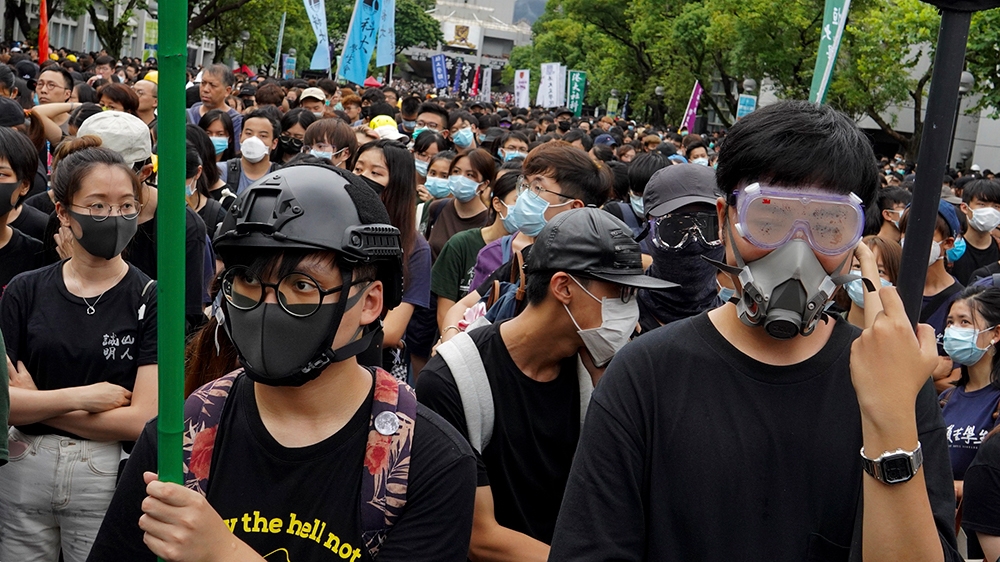Hong Kong’s losses may be Singapore’s gain, new survey shows
As the rivals compete to be Asia’s top financial hub, fallout from protests in Hong Kong is seen as helping Singapore.

Singapore – Business confidence in Hong Kong is being hurt by ongoing protests in the Chinese city, and Singapore – Hong Kong’s long-time rival – stands to become Asia’s leading financial hub and is likely to see economic gains as a result.
That’s the finding of a survey by the American Chamber of Commerce in Singapore released this week. But analysts say it’s too soon to write Hong Kong off as an important Asian business centre.
Keep reading
list of 4 itemsThe Take: Where are Hong Kong’s protesters now?
Hong Kong’s new security law comes into force amid human rights concerns
Hong Kong passes tough new national security law
Enormous and sometimes violent protests, now in their 14th week, have at times paralysed Hong Kong’s streets, mass transit system and airport. That is prompting employers in sectors such as banking, financial services, and hospitality to weigh the costs of doing business in that city and to consider relocation to other Asian cities, business analysts say.
The survey of Singapore business owners, conducted from August 21 to 29, was based on 120 responses collected from a diverse range of companies, many of which have a presence in both cities. Those executives say they feel that damage to Hong Kong’s reputation as a regional base of operations will likely discourage future investments and expansions in that city.
According to the survey, 80 percent of respondents said the Hong Kong protests have affected their decisions on investing in the territory.
Also, 22 percent of firms with operations in Singapore and Hong Kong were considering moving capital out of Hong Kong, but only five percent have done or have immediate plans to do so. When it comes to business functions, 23 percent of the firms said they were considering moving them, but only one percent have taken more concrete measures.
More than 90 percent of the respondents picked Singapore as the best destination for their capital or business functions away from Hong Kong.
Hong Kong’s self-styled “Asia’s World City” tagline continues to take hits amid widespread fears that China is rolling back the freedoms implicit in its “one country, two systems” policy towards the self-governing territory.
‘A significant crisis’
But analysts say the long-term effect remains unclear, as company relocations are generally planned well in advance and can take years to unfold. They say that there are no signs yet of a mass exodus from Hong Kong to Singapore or elsewhere.
“Has sentiment been impacted? Absolutely, no doubt about that,” said Damien Ryan of Teneo Strategy, a Hong Kong-based communications strategy firm, at a panel discussion on the survey results.
“Are businesses reviewing plans and making those decisions to relocate? I think that’s a little bit early at the moment, simply because we’re in the middle of what is a fairly significant crisis,” he added.
In addition, relocations can sometimes be hard to gauge. For example, companies that are growing in Asia might add new staff to a regional office in Singapore or elsewhere rather than to one in Hong Kong.

The protests are largely limited to weekend demonstrations, noted Anupama Puranik of the executive search firm Russell Reynolds Associates.
“It’s a weekend story to a large extent, and Monday to Thursday, Monday to Friday, it’s pretty much business as usual for most companies,” she said. “But if this trend continues, you start seeing things getting decidedly worse than what they are today, it might start triggering [relocations] in the next six to eight months.”
An earlier survey by the American Chamber of Commerce in Hong Kong also found Singapore will likely be the primary beneficiary if business confidence in Hong Kong faltered.
“International businesses are feeling pessimistic about the short-term prospects for Hong Kong as escalating violence and political deadlock take their toll on operations and fuel perceptions that the city is becoming a riskier place,” the business group said.
Recent economic indicators continue to bear bad news for Hong Kong.
The credit rating agency Fitch last Friday lowered Hong Kong’s general outlook from “stable” to “negative” and cut its debt rating from AA-plus to AA.
Hong Kong’s tourism sector has seen a double-digit percentage decline in visitor arrivals this summer, according to the Hong Kong Tourism Board. Hong Kong visitor arrivals fell nearly 40 percent in August from a year earlier, and occupancy rates in some hotels have halved, finance secretary Paul Chan said.
Meanwhile, Singapore’s hotels, entertainment venues, and restaurants may see the biggest gains as a result.
‘We can find a way’
While businesses may take a wait-and-see attitude, short-term activities such as conferences and events have been affected. For example, the Global Wellness Summit, which was set to take place in Hong Kong in October, will be moved to Singapore because of the protests.
Hong Kong Chief Executive Carrie Lam has acknowledged the crisis hurt the economy more than the 2003 SARs coronavirus epidemic and the 2008 financial crisis.
But on Wednesday, she expressed hope that business confidence could be restored. “We can find a way back to reasoned discussion, to social stability … after all, Hong Kong has been built and rebuilt time and again on our indomitable resilience”.
Hong Kong and Singapore are wealthy former British colonies. But while Hong Kong is a special administrative region of China, Singapore is a sovereign country that is highly organised, regulated, and controlled by the longest-governing incumbent party in Southeast Asia – and where public demonstrations are peaceful and rare.
The island-nation grants its citizens the right to protest only within a designated area called Speaker’s Corner, tucked inside a small (0.97 hectare) park, where prior registration on a government website is required.
Rights groups such as Human Rights Watch have long criticised Singapore for stifling free speech, something the government denies. But the government has always maintained a pro-business set of policies and ensured intellectual property rights are safeguarded.
As a result, the country regularly appears near the top of ease-of-doing-business rankings. For instance, the World Bank ranks Singapore as the second-easiest place to do business after New Zealand, two places above Hong Kong.
While the trade war between China and the US rages, Singapore maintains good diplomatic relations with both countries and remains neutral in the intensifying rivalry.
But Singaporeans are careful not to gloat over the anti-government unrest in Hong Kong, a neighbour and trading partner.
Their export-dependent economy has shown signs of weakness as it gets caught up in the US-China trade war. Exports, excluding oil, fell by 11.2 percent in July, the fifth straight month of declines.
Eugene Tan, associate professor of law at Singapore Management University, says short-term gains to Singapore may be outweighed by damage to business confidence in the region.
“At one level, in terms of firms relocating from Hong Kong to Singapore and firms using more services out of Singapore, Singapore benefits. Talent may also seek to explore work opportunities in Singapore. People may seek to park their funds in Singapore instead of Hong Kong,” Tan told Al Jazeera.
But he adds, “The unrest [in Hong Kong] only adds to the extant global economic uncertainty. In turn, this fuels the dip in investor confidence and will weigh on investments and economic activities in the region.”
Even if Hong Kong’s losses are Singapore’s gains, other financial hubs in Asia are likely to vie for the pole position. For example, mainland China is positioning Shanghai as a future alternative to Hong Kong as a global financial centre.